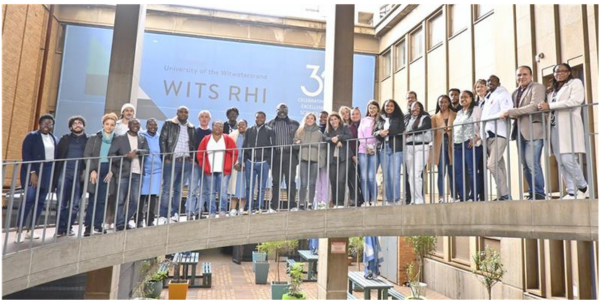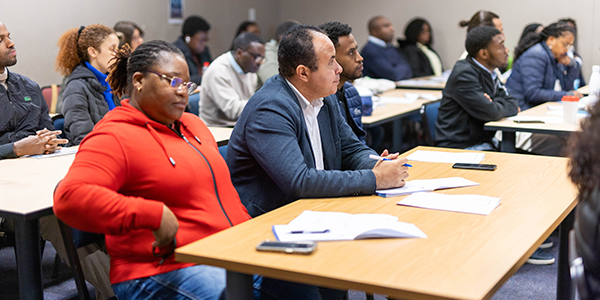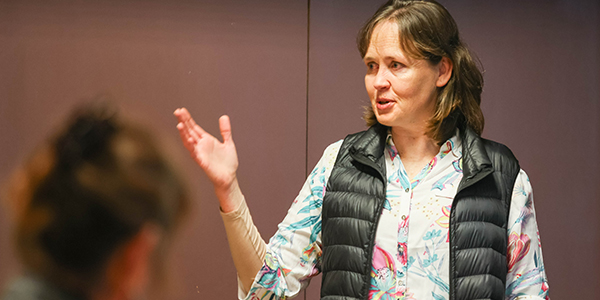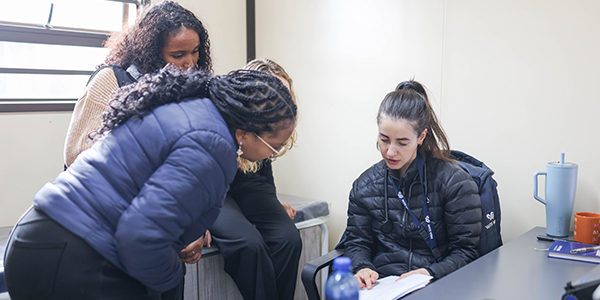Birth of first African Blended Intensive Programme
- Wits University
CIVIS network African associate Wits University hosts students studying maternal and neonatal immunisation.

As part of the CIVIS Blended Intensive Programme (BIP) in Maternal and Neonatal Immunisation, students from Africa and Europe visited the University of the Witwatersrand (Wits University) in Johannesburg, South Africa and public health facilities, from 21-25 July 2025.
CIVIS is a network of 11 European universities which, since 2022, has included six African associate universities.
Wits University is the only South African institution in the CIVIS association.
CIVIS BIPs are co-led by three or four academics from different universities. Student mobility is an important component of BIPs, to encourage international exposure and learning.
BIPs comprise a 13-week course, a major assignment and assessment, and culminate in the students visiting the host university for a week.

A first in Africa
The physical mobility component of the BIP in Maternal and Neonatal Immunisation in Johannesburg, South Africa in July 2025, was the first in-person BIP outside Europe, and the first in Africa. This BIP has already been approved to take place again in 2026.
The Wits CIVIS BIP representative Associate Professor Clare Cutland is the Scientific Coordinator at the Wits African Leadership in Vaccinology Expertise (Wits-ALIVE). She coordinates postgraduate vaccinology training at Wits University, including the Master’s in Science (Medical) in Vaccinology and the African Advanced Vaccinology (Afro-ADVAC) short course.
Cutland says, “The BIP in Maternal and Neonatal Immunisation is a new programme and unique in the fact that the mobility component takes place outside of Europe. As such, this is the first time that the students participating in this CIVIS BIP have travelled to South Africa to do their physical mobility component at Wits University.”

Twenty students from Africa and seven from Europe, as well as four lecturers, participated in the physical mobility component of this BIP. African students hailed from the Democratic Republic of Congo, Egypt, Ethiopia, Gabon, Nigeria, South Africa, Tanzania, Uganda, and Zimbabwe. The European students came from Belgium, France, and Greece.
Professor Arnaud Marchant leads the European side of this BIP. He is the Director of the European Plotkin Institute for Vaccinology at the Université libre de Bruxelles (ULB), Belgium.
Marchant says, “For us it was essential to have the in-person component happening in South Africa. The massive global burden of disease is happening in the south, so it’s very important that students from the north and from the south meet and talk about how to address these challenges.”
Professor Vana Papaevangelou, Associate Professor of Paediatrics at the National and Kapodistrian University of Athens, Greece, accompanied four of her master’s students to South Africa.
She says, “We are very excited to be here, getting a lot of experience and input from a completely different setting, a place where maternal vaccination is a success, whereas in Greece, we have a long way to go. It’s a country with a very low percentage of maternal vaccination.”
Inside South African maternal immunisation
The mobility component of this BIP included visits to Wits VIDA, which is based at Chris Hani Baragwanth Academic Hospital (‘Bara’) - a Wits University teaching hospital - in Soweto, and to Wits RHI in Hillbrow as part of a five-day jam-packed programme.
At Bara, the students toured the hospital, including the maternity and paediatrics wards. The students had the opportunity to spend time in Wits-VIDA’s clinical trial facilities, where they observed participant screening, enrolment and sample collection, and reviewed vaccine storage, handling, dispensing and administration procedures.
Ugandan James Tumusiime, a Wits alumnus and currently with the Uganda Virus Research Institute, says, “I think one of the things that actually stands out is they aren’t doing it simply by themselves, as South Africans, but they are collaborating with various organisations and universities in Europe and in Africa as well, as a region.”

Sample processing and storage procedures were demonstrated in the Wits VIDA laboratory. Strategies for recruiting participants for vaccine trials and engaging communities were discussed, as were clinical trial data collection, management and data analysis.
Also on the agenda were discussions on vaccine safety considerations for maternal and neonatal vaccine trials, including the eligibility and screening process, regulatory and ethical considerations, quality assurance and monitoring.
Oussama Soulimani, from Brussels, completing a master’s in biomedical science, says, “In my country, everything is digitalised. Here I can see the involvement and the motivation from all the workers and even the community that allow it – even with a lot of challenges – to be efficient and cost-effective.”
Inner-city primary healthcare
The visit to Wits RHI included an overview of maternal and neonatal immunisation activities at the Hillbrow precinct, including discussion and demonstration of the Ubomi Buhle pregnancy registry enrolment and ultrasound examination for gestational age assessment. Routine antenatal care activities were observed during a tour of the Shandukani Antenatal Clinic and Midwife Obstetric Unit, a primary healthcare clinic.
Dr Dorothea Stathaki, from Greece, currently doing a master’s in paediatric infectious diseases, didn’t know what to expect when she arrived in South Africa, but says, “I was impressed by the ongoing research. They’re doing some impressive work on vaccination programmes and clinical trials, and I’m impressed by the dedication, and how many programmes are going on.”
Even local South African Wits student, Nokhanya Sangweni, was struck by the differences between Wits VIDA in Soweto and Wits RHI in Hillbrow: “I like that we alternated between the two, so we were able to compare the two research centres and see how different they are and also how they do actually work quite closely with one another,” she says.
For Ethiopian student, Dr Bersabeh Mekasha Kassaye, the most interesting and inspiring part was going to the clinics, visiting the clinical trial units, and seeing clinical trials executed in real time, despite challenges with patient caseloads and record-keeping.
“But having visited the clinical trial units and getting to see several projects that they have implemented at this site for the past 25 years has been really interesting – to understand that it is possible to implement such studies under several constraints and challenges.”
Planning for the second CIVIS BIP in Maternal and Neonatal Immunisation, in 2026, is underway. Applications for this BIP for master’s and PhD students open in October. For more information, visit https://civis.eu/en/learn/course-types/blended-intensive-programmes.

